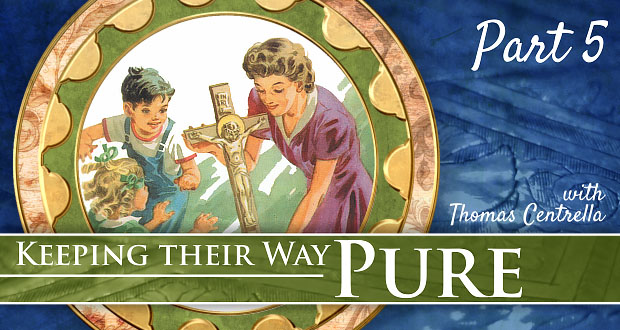by Thomas J. Centrella
How can a young man keep his way pure? By guarding it according to Thy Word. Psalm 119:9
How can we as Catholic parents help our children keep their way pure when they go out into the world? This is the final installment in a series of articles on seven practices that can help our children—as well as ourselves—stay on the right path. Last time, we discussed something that is integral to our entire Catholic Faith: Cultivation of a Personal Relationship with Jesus Christ.
Besides making the Act of Faith we discussed, how can our children truly come to know Our Lord Jesus Christ and grow in a personal relationship with Him? We have already discussed the miracle of receiving Jesus daily in Holy Communion, spending time with Him in Eucharistic Adoration, and encountering Him in frequent Confession. We have stressed the importance of having the mind of Christ by knowing the mind of the Church and avoiding being immersed in the mindset of the world. We have mentioned devotion to the one who is closest to Jesus, the Blessed Virgin Mary, by praying the Rosary. And we have touched upon the importance of charity and service to others, starting with those at home.
All of these practices are excellent, and they most certainly can help our children to grow in their relationship with Jesus Christ. However, there is one more practice that, today, more than ever, every Catholic needs in order to stand firm in the Faith: Daily, Reverent Reading of Sacred Scripture.
7. Daily, Reverent Reading of Sacred Scripture
With my whole heart I seek Thee; let me not wander from Thy Commandments! I have laid up Thy Word in my heart, that I might not sin against Thee (Psalm 119-10-11).
In the “Armor of God,” with which we are all called to equip ourselves (Ephesians 6:10-18), the Word of God is the “sword of the Spirit.” Daily, reverent reading of Sacred Scripture can help us to immerse ourselves in the mind of Christ and cultivate our personal relationship with Him. It can also help us to develop a living, breathing, personal relationship with the Holy Spirit, the Author of Sacred Scripture.
The best commentary I know of that is included in the Bible itself is that of Rev. Fr. George Leo Haydock in the Douay-Rheims translation of the Bible. This commentary is excellent and completely trustworthy. It is focused on the reverent reflections of the Fathers of the Church. The Roman Theological Forum (www.rtforum.org) also has some excellent material about the Bible.
However, the best way to truly consume the Word of God is to actually read it in the quiet of our own home. In order to know Sacred Scripture, we must read it regularly, read it reverently, and read it slowly and carefully. Many years ago, I made a commitment to read at least one page of the Bible every day. It is amazing how much God has blessed me through this commitment! I urge you to make this commitment as well and to encourage your children to do the same. If you are faithful to this commitment, God will bless you for it. “And I am sure that He who began a good work in you will bring it to completion at the day of Jesus Christ” (Philippians 1:6).
Here, I must interject a word of caution, however. Evangelical Christians and other Protestants make the grave error of what is called Sola Scriptura (“Scripture Alone”). Obviously, we as Catholics do not accept this false teaching. Rather, we accept both Sacred Scripture and Sacred Tradition (the oral teachings and practices passed down by the Apostles), as well as the authority of the Magisterium, which Jesus established (Matthew 16:17-19, 18:18). In fact, Sacred Scripture itself clearly exhorts us to “stand firm and hold to the traditions which you were taught by us, either by word of mouth or by letter” (2 Thessalonians 2:15).
However, that does not mean we should not read Sacred Scripture at all. In avoiding the error of Sola Scriptura, some Catholics seem to fall into the opposite error, which we might call Omnia Praeter Scripturae (“Everything Except Scripture”). This is a false teaching as well. The truth is that Scripture alone is not sufficient, but neglecting Scripture is not acceptable either. The Magisterium of the Catholic Church teaches:
The Church “forcefully and specifically exhorts all the Christian faithful … to learn ‘the surpassing knowledge of Jesus Christ,’ by frequent reading of the divine Scriptures. ‘Ignorance of the Scriptures is ignorance of Christ’” (Catechism of the Catholic Church, no. 133).
If we attend daily Mass, we will hear different readings from the Bible every day. So, in addition to receiving Our Lord and Savior Jesus Christ in Holy Communion, we will receive Him in His Holy Word. However, I think it is still helpful to sit down and read the Bible ourselves as well, where we can do so at our own pace and in our own quiet place.
Ultimately, we need to read the entire Bible, but some books of the Bible are easier to read than others. For someone who has never read the Bible before, I suggest reading it in the following order: (1) Matthew through Acts of the Apostles, (2) Psalms through Sirach, (3) Romans through Jude, (4) Genesis through Job, (5) 1 and 2 Maccabees, (6) Isaiah through Malachi, (7) Matthew through Acts again, and (8) the Book of Revelation (the Apocalypse). For children, however, parents should carefully determine which texts they are ready to read. It is all God’s Word, but in some places it is somewhat explicit in warning against certain evils.
We should always begin our reading with a prayer such as the following: “Oh, Holy Spirit, please help me to understand your Word, learn what you want me to learn, and be the person you want me to be.” God wants us to consume His Word so that the Holy Spirit can transform our heart and mind to be like the heart and mind of Jesus.
Remind your children that at first there may be many things in the Bible that they do not understand, and some may even bother them. They should be humble in such situations, admitting to God their difficulty and then moving on to the next verse—always prepared to submit to the judgment of the Magisterium of the Catholic Church, which the Holy Spirit guides to authentically interpret the Word of God according to the mind of Christ.
Remember that the Bible, in its original language, is free from all error. It is literally “the speech of God as it is put down in writing under the breath of the Holy Spirit” (Catechism of the Catholic Church, no. 81). The principal Author of Sacred Scripture is the Holy Spirit, and the human authors are His instruments. He is God, All-Perfect and All-Knowing. He does not make mistakes! Therefore, we can completely trust Sacred Scripture. Every time we read it, we encounter Jesus Christ Himself, who is the Word.
But as for you, continue in what you have learned and have firmly believed, knowing from whom you learned it and how from childhood you have been acquainted with the Sacred Writings which are able to instruct you for salvation through faith in Christ Jesus. All Scripture is inspired by God and profitable for teaching, for reproof, for correction, and for training in righteousness, that the man of God may be complete, equipped for every good work (2 Timothy 3:14-17).
Every time your children read the Bible will be like a drop of water penetrating a new sponge. At first, no change will be noticed. However, over time, their minds, like the sponge, will expand, as they grow in the wisdom and knowledge of the Lord. Their hearts will become more steadfast, yet more pliable in the hands of God. Their souls will be filled with God’s Holy Word. One day, you will look back and realize that the Holy Spirit has transformed their lives.
Conclusion
“Everyone then who hears these words of mine and does them will be like a wise man who built his house upon the rock; and the rain fell, and the floods came, and the winds blew and beat upon that house, but it did not fall, because it had been founded on the rock” (Matthew 7:24-25).
I pray that this series of articles will be helpful to all who read it, and that God will give all of us the grace to be wise and courageous as we strive to raise our children as good sons and daughters of the Church in a culture that is becoming increasingly corrupt. If we ourselves strive to follow these seven practices, I am sure God will bless us for it. If, by His grace, we are also able to instill them in the lives of our children and they remain committed to these seven practices, then I believe our children truly will be like the house that was built on Rock.
And when the rain falls, and the floods come, and the winds blow and beat upon them, they will still stand.
- Daily Mass and Weekly Eucharistic Adoration
- Frequent Confession
- Immersion in the Mind of Christ, Not the World
- Devotion to Mary through the Daily Rosary
- Charity and Service to Others
- Cultivation of a Personal Relationship with Jesus Christ
- Daily, Reverent Reading of Sacred Scripture

 Seton Magazine Catholic Homeschool Articles, Advice & Resources
Seton Magazine Catholic Homeschool Articles, Advice & Resources

